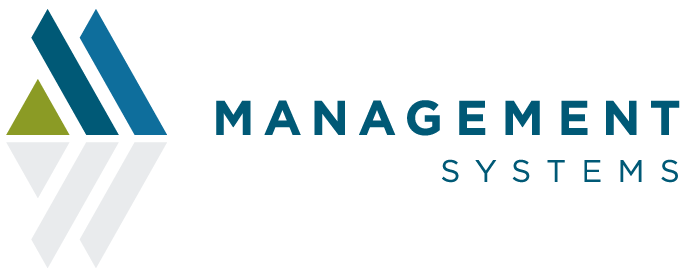Performance Management
Management Systems’ performance management tools help you build a sustainably successful organization by increasing the effectiveness of plan implementation and by promoting accountability throughout your company.
We define “performance management systems” as the “processes or systems that you use to motivate people on your team to achieve your goals.” While some approaches focus on only one component of these systems – e.g., individual performance evaluation forms, creating corporate scoreboards, etc. – our approach focuses on helping you develop a fully functional integrated system that links what you want to achieve as a company to what teams and individuals need to do to support these goals.
Our work with you on performance management system design and implementation can take many forms, depending on your organization’s needs. This can include:
- Providing training to you and your team on how to design and implement effective Performance Management Systems, using Management Systems’ proven approach.
- Assessing the effectiveness of each component of your company’s or a specific department’s current performance management system. This involves evaluating the effectiveness of:
- Your company’s plan and “planning process” including:
- The content of your plan – specifically, the extent to which your plan clearly defines your company’s Key Result Areas, Objectives, and Goals;
- The process you use to communicate and reinforce your company goals throughout your organization.
- The measurement systems you use to assess progress against your plan.
- Feedback/Progress Review systems – how and when you and your team review progress against your goals.
- Evaluation System – the process you and your team use to evaluate overall performance at the end of your “planning period” (typically the end of each year).
- Reward Systems – how and what you reward people for.
- The “linkages” between all components of your company’s performance management system – that is, the extent to which you actually have a “system” versus just individual components.
- Your company’s plan and “planning process” including:
- Assessing the effectiveness of each component of your company’s or a specific department’s current performance management system. This involves evaluating the effectiveness of:
- Assessing the effectiveness of your company’s individual performance management system. This involves evaluating the effectiveness of:
- Job/Role Descriptions that should be used both as hiring tools and to help position-holders understand basic expectations of performance.
- Individual performance criteria/Goals – what you use as the basis for performance evaluation and how these Goals/performance criteria link to what you want to achieve as a company or department.
- The measurement systems used to evaluate individual performance.
- Feedback/Review processes – how and when individual managers provide feedback to each direct report on his or her performance.
- Performance Evaluation System – the process used to evaluate individual performance on an annual basis.
- Reward System – how and what people are rewarded for on an individual basis.
- Partnering with you in the design/re-design of your company’s performance management system and its implementation. This can include designing a system to promote the achievement of specific results, enhancing the effectiveness of one or more components of an existing system, creating tools to support effective system implementation, and working with you to design and implement programs to help managers/leaders develop the skills and capabilities needed to fulfill their roles as implementers of the system.
- Working with you to develop and use “Key Result Area-Based Role Descriptions” that serve as the foundation of effective individual performance management. Hundreds of companies have successfully used our Key Results Area-Based Role Description methodology to enhance individual performance.
- Helping your company develop and implement a SMART Goal-based individual performance evaluation process which:
- Focuses individuals on effectively performing their roles and on achieving results;
- Uses specific, measurable, time-dated Goals as the standards against which performance is evaluated;
- Clearly links individual goals with company and/or department goals (that is, by individuals working to achieve their goals, they are contributing to the achievement of company goals).
- Helping you develop “Performance Scoreboards” for the company as a whole, divisions, departments, or individuals that provide you with quick summaries of performance against your most critical Goals. Customized Performance Scoreboards provide managers/leaders with the information they need to identify “what’s working” and “what’s not working” with respect to achieving company Goals. Analysis of Scoreboards helps managers/leaders proactively adjust plans to promote the greatest success.
